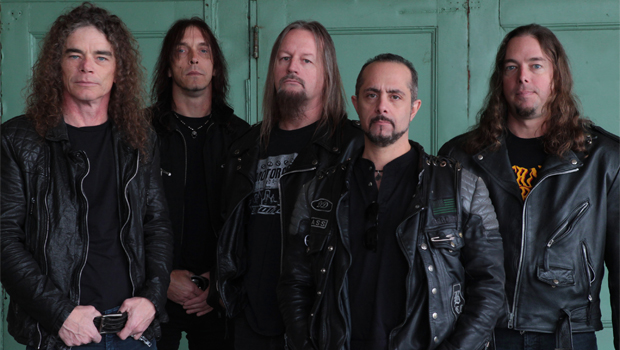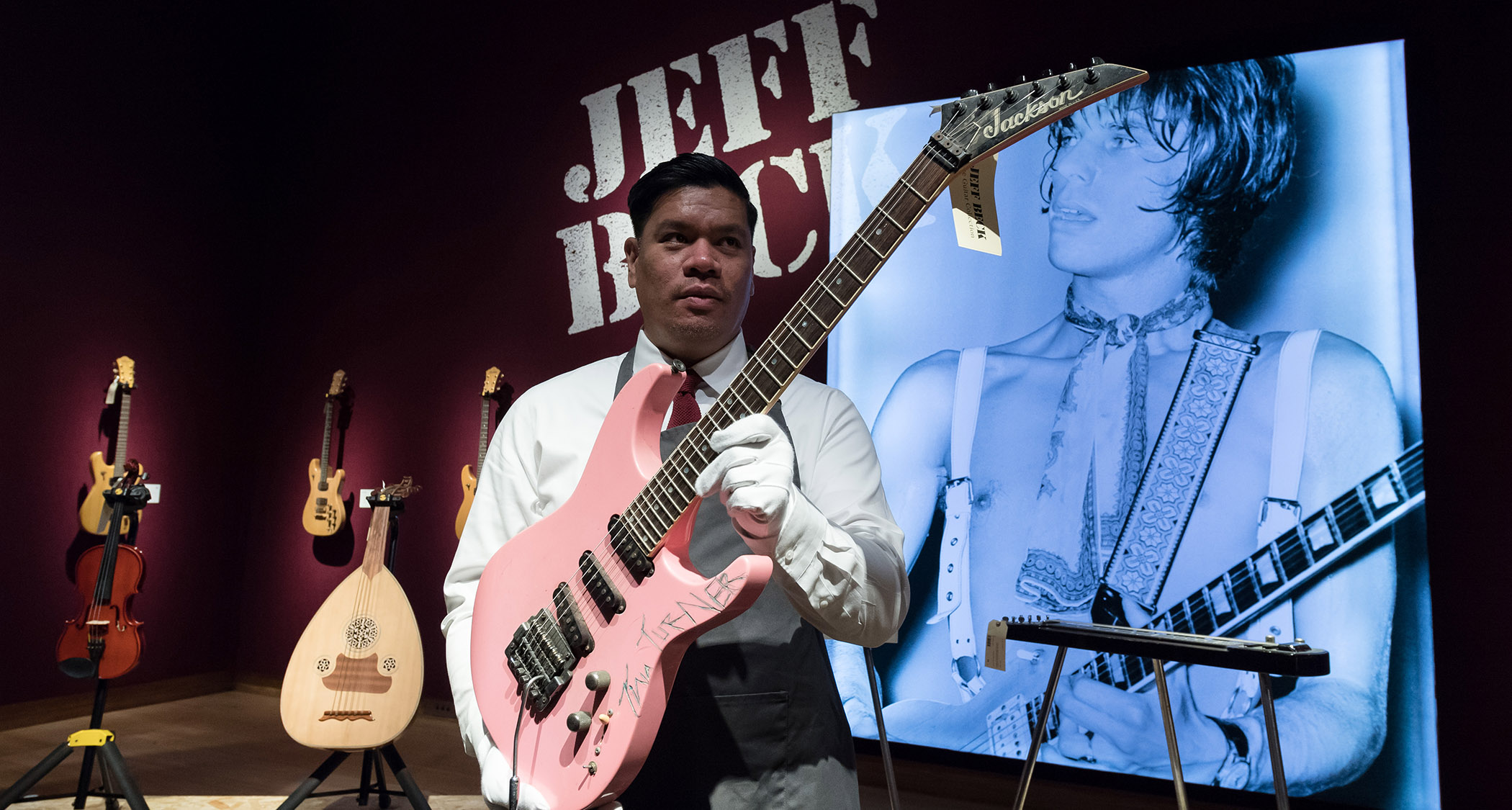
When Bobby "Blitz" Ellsworth showed up at Guitar World HQ for our interview, it was already past 5 p.m. on a press-packed day.
In spite of that, he showed up good spirits, and with the same youthful energy that has made him one of the most electric performers in thrash metal for over three decades now.
The occasion for Bobby's visit is, of course, the release of Overkill's sixteenth studio album, The Electric Age, which hit stores earlier this week on eOne.
The new record is everything you've come to expect from the boys in Overkill over the years: ten tracks of upbeat thrash, of a slightly punkier variety that that of their Bay-area counterparts.
Tracks like "Electric Rattlesnake" and "Wish You Were Dead" fit comfortably alongside anything from Under the Influence, and over 30 years into their career, Overkill are showing no sign of slowing down.
This is your third straight Overkill record with the same lineup. I know it's a bit like asking you to pick your favorite kid, but how do you rate this lineup against the previous incarnations of Overkill?
My wife calls it the middle-aged boys club. [laughs]
All the latest guitar news, interviews, lessons, reviews, deals and more, direct to your inbox!
"You boys are out there working again, aren't you?"
"Honey, I can't talk right now, I'm doing an interview."
She goes, "Are you winning at dice?"
"No, I'm not" Click. [laughs]
But I think that really says a lot. If there's a bunch of guys who are complaining about each other on the bus, saying, "I like to play the shows with you, but it's hard to live with you," because we're in such tight quarters, that would suck. The chemistry is definitely at a high level, and I think that's definitely reflected to a degree in the last few records.
If I had to contribute it to one member, I'd say Ron [Lipnicki, drums] has brought a good energy to us. He's youthful — and it's funny when the kid in the band is 40 or 42 — but it's still a youthful energy compared to the rest of us, and I think the rest of us have raised our levels to his.
These last couple of Overkill records have been... I don't know, brighter sounding? They're not dark; they reflect a healthy metal scene as opposed to that late '90s/early '00s sound.
It seems like a lot of thrash bands took a darker turn around the turn of the century took a darker turn, but the scene is back to having a more positive vibe.
Upbeat!
You and D.D. [Verni, bass] have been doing this for over three decades now, and somehow Overkill has remained one of the most consistent thrash bands to come out of that era. How do you manage to keep things fresh without rehashing ideas?
I think the idea is to first understand who you are. At the end of the day, it's always going to have the Overkill stamp on it.
Every nuance that changes is really recognized by us. There aren't four-part harmonies coming in, and all sorts of harmony guitar work and "hey, let's add keyboards," because it is an Overkill record.
I remember sitting down with D.D. and talking about this record and saying, "You want to talk about this?"
He goes, "Well, we're not gonna reinvent the fuckin' wheel are we?" [laughs]
But I think even with that sort of lackadaisical towards what we're going for, what keeps it fresh is knowing who we are and at the same time not being afraid to move in certain directions within that space. That kind of keeps each record different.
For the last two records, we've had signs all around the studio that say, "Don't repeat yourself." There's a fine line between repition and style.
So the title of the new album is The Electric Age. Tell me a bit about the theme behind that. Where did the title come from?
As simple as, "Why do you join a band?" Because it's cool! [laughs]
When were still writing the album, I had the lyrics in a folder on my computer titled "Power Company," and we were looking for something that sounded institutional, where people go, where they have to go, somewhere that sounds big and almost conglomerate like to some degree.
So it was "Power Company," it was "Northeast Power Works," "Jersey Power and Light" — whatever it may be. I came up with the title "Electrocution Therapy" one day and jotted it down and sent it to D.D.
For me, it became "Electric Rattlesnake," and then he sent me The Electric Age.
When we're doing titles you try to make the email just one title so it either has impact or it doesn't. So that was all it said on the page, and I said, "You know, that's actually pretty cool."
Where do you find yourself drawing inspiration for lyrics these days?
They're personal, primarily. I try to always stay away from political and social issues. I don't think it's my place to tell people who to think, or even to make them hear my opinion, because they don't necessarily reflect those of the band.
When it comes to emotions, I think one of the things is that, even though emotions are similar, they all seem different under certain circumstances. For instance, this is a positive chemistry that we have within the band, and a lot of those emotions may be very positive. I don't feel a dark feel on this record. I don't hear a "poor me," or a downtrodden type feel. I feel an aggressive, almost addictive, "I want a little more," type feeling.
I think the emotions I collect between records is what inspires me. Really, I do the phonetic vocal lines prior to doing the lyrics, and I feel those in later. I don't want to sound too artistic, but eventually the song starts speaking to you. You start throwing phonetics into a song and playing with the beat, as a vocalist — getting between the beat, getting on the beat — and eventually words start showing up, and I use those words as a jumping off point.
"Wish You Were Dead" was the first song from the new album that a lot of people heard. What's that song about?
I've always thought that to be one of the most extreme expressions with regards to emotion. You've heard people use it: "I just with that motherfucker was dead." Usually when someone leaves the room. Well I have anyway. [laughs]
I don't know if I've used it, but in the song it's really kind of a tongue-in-cheek sense of humor. If you look through the lyrics, the bridge section is where I use the characters of Batman and Superman. [laughs] So it almost becomes cartoon-like. And I think if you take it from cartoon-like, it almost becomes positively emotional as opposed to negatively violent.
Thrash has always been about getting those negative feelings out in kind of an over-the-top way before they were allowed to become a negative force in your life.
It's a cleansing. My wife says, "The lyrics are done, I've got a better man to live with now!" [laughs]
Did the songwriting process for this record differ any from more recent albums?
Well, if you liken it to building a house, D.D.'s really the foundation. He collects those riffs, and that can happen at any time since the last record had been delivered. He's one of those people that travels around with a recording device that will hum in it; he has a guitar in his office and one in his bedroom, he has a studio — there's always someplace to record, on the tour bus or on the stage.
The assembly of the record usually takes about eight months, or in this case did. Ron and D.D. sat down with the rest of us and started doing demos for the drums, figuring out beats for these riffs.
But one of the unique things we did on this record, because D.D. owns the studio that we use, is we took our time and did live shows in between. I think that was indespensable to what the record has to offer. We would do drum track demos and then we'd be down in Mexico, and then we'd come back and say, "Okay, let's do the real drums." So Ron was just playing live in Mexico and now he's recording the drums, and that live feeling was not feigned, it was simply right before that.
I think having the luxury of times and having those live performances in between recording gave us a record that's power-packed.
Overkill's new album, The Electric Age, is out now.
Josh Hart is a former web producer and staff writer for Guitar World and Guitar Aficionado magazines (2010–2012). He has since pursued writing fiction under various pseudonyms while exploring the technical underpinnings of journalism, now serving as a senior software engineer for The Seattle Times.

